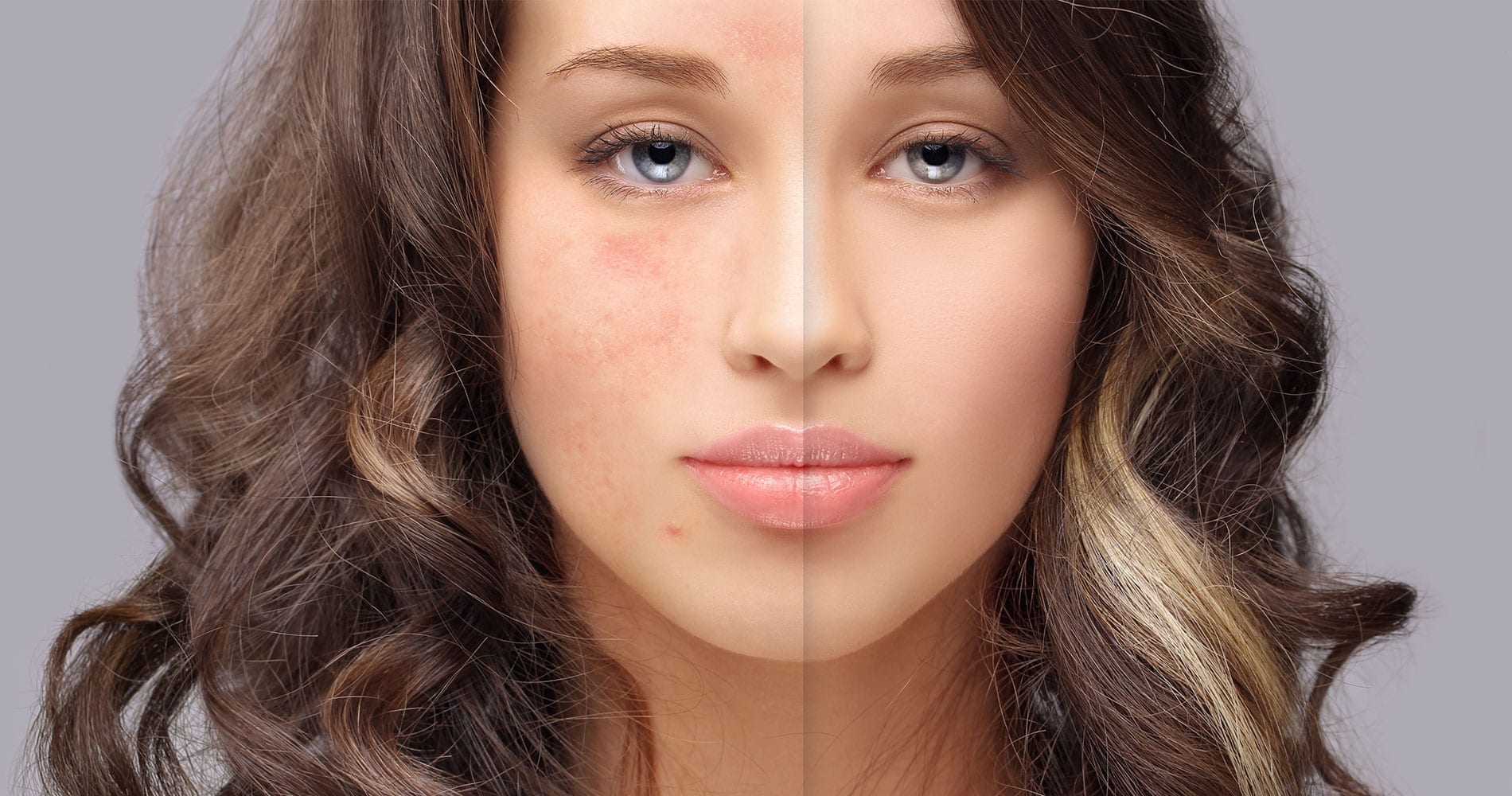
April is Rosacea Awareness Month
According to the National Rosacea Society, more than 415 million people worldwide are affected by rosacea. Rosacea is an autoimmune condition that affects the skin, mainly in the middle of the face and in some cases even the eyes. It’s not a dangerous condition in its self, but still requires treatment because of the links to other sun-caused skin conditions, such as actinic keratoses and skin cancer. April is Rosacea Awareness Month so we are taking this opportunity to broaden your knowledge of the skin condition and talk about what treatments there are for those suffering from it.
What is it exactly?
The Mayo-Clinic defines rosacea as “a common skin condition that causes redness and visible blood vessels in your face. It may also produce small, red, acne-like bumps.” The condition can affect anyone but is most commonly found in middle-aged women who have fair skin. During a flare-up, it’s often confused with acne as it can also produce small “pus”-filled bumps. There is currently no cure, but there is excellent treatment to curb and maintain rosacea.
What are the symptoms?
Redness of the face: the most common symptom of rosacea is redness on the face, usually in the centre, that doesn’t go away. This is a sign of chronic low-grade inflammation.
Swollen red bumps: many people who have rosacea will also experience small red bumps that resemble acne. They can be filled with what looks like pus and may cause the skin to be hot and tender.
Eye irritations: many patients with this skin condition may also experience irritated, red, swollen eyes and eyelids.
Enlarged nose: more common in men than women, over time the skin on the nose can thicken and become enlarged due to the rosacea.
What Is Causing Flare-ups?
This skin condition leaves your skin overly sensitive to things that wouldn’t bother someone with healthy skin. There is no known cause of the condition but everyday activities, foods and products can often be the cause of a flare-up. An easy way to remember common rosacea triggers is “ANYTHING HOT” = 50% culprit! Here is a list of common flare-up triggers:
- Excessive exercise
- Hot beverages
- Too much direct sunlight
- Spices (spicy food)
- Baths/showers/jacuzzi’s
Other triggers:
- Wind
- Cold
- Alcohol
- Skincare products
- Haircare products
- Stress
- Certain medications
- Certain makeup products
It’s important to identify what is triggering your rosacea before you consider a treatment plan. Knowing what causes a flare-up will help your skincare professional determine the best course of treatment. Pin-pointing those triggers before treatment can also help treatments be more successful.
A helpful way to learn what is triggering your rosacea is to keep a journal. Keeping track of the times when your skin becomes flushed, inflamed, tender or hot and writing down anything you ate, your activities or skincare routine that day are the best way to determine what your triggers are. Keep in mind that what triggers a flare-up for someone else, may not do the same to you so it’s extremely important to know YOUR causes.
Are There Treatments Available?
Once your doctor or dermatologist confirms the condition, they can work with you to understand what treatments are available and determine which ones will best work for you. Treatments can include things like oral medication, skincare routine, topical medicated creams or therapies. Oftentimes patients require a combination of all of these things to keep their condition under control and sometimes it requires trying different things to find what works best for your skin type.
Topical drugs: depending on the severity of your case, your doctor or dermatologist may prescribe a medicated cream to apply daily to the skin. Some topical drugs work quickly to fight the appearance and inflammation of rosacea, while others are not as potent and need to be applied more often to see results.
Oral medications: patients can be prescribed an oral antibiotic to help fight any bumps or pimples associated with the condition, but this is reserved for acute cases only.
Therapies: there are a few different types of laser or light therapies available that help fight the effects of rosacea. IPL Photofacials for example, is a light-based therapy that stimulates the collagen below the epidermis. The pulses of light are designed to make existing collagen constrict which helps in treating redness, wrinkles, and pigment irregularities through the targeting of desired chromophores.
Facials and masks, applied by medical skincare professionals, can also help to reduce redness, swelling and irritation.
What About My Daily Skincare Routine?
When you suffer from rosacea, it’s extremely important to have a healthy and safe daily skincare routine. If your doctor or dermatologist has given you topical creams, be sure to apply them as directed in order to see any change.
Avoiding cheap, harsh, scented products is also important in reducing the symptoms and possible flare ups. There are hundreds of thousands of skincare products on the market today and the truth is many of them are packed full of extremely harmful ingredients, perfumes and chemicals. Anyone with sensitive skin or underlying skin conditions should avoid these products at all costs. Even a simple condition like chronic dry skin is often made worse by bad products.
At Ageless Living, your skin is our #1 concern so we offer a large variety of healthcare-professional recommended products that won’t harm the skin further. Alumier’s Calming Collection is the perfect skincare regime for someone with a condition like rosacea. The products in this collection are designed to cleanse, calm, moisturize and reduce redness in the skin.
If you are suffering from any skin condition, including rosacea and need some help determining a treatment plan and finding the products that are right for your skin, the trained and knowledgeable healthcare professionals at Ageless Living Cold Lake are here to help. Book a consultation today and take the first step to getting back to your best self.


